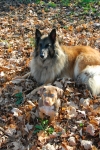Jeff Silverman

Jeff is a Certified Dog Behavior Conultant (CDBC), and co-owner of Training Tracks Canine Learning Station with 2 full-service training centers in Southwest Ohio. He has been working with dogs for over 20 years, and training professionally since 1998. He specializes in working with fearful and aggressive dogs and assisting animal shelters in creating behavioral enrichment programs and support services for adopters. He also serves on the Board of Trustees of the Association of Pet Dog Trainers. Jeff has a BA in political science, completed the coursework (if not the dissertation) for a PhD in history, and has a background in IT management consulting in addition to dog training. This background inspires and informs a special interest in the professional culture and institutions of the dog training profession. He lives in College Corner, Ohio his partner in business and in life, Melissa “Mel” Bussey. They share their home with 4 dogs - Maggie, Ubu, Professor Chaos, and Miley as well as 2 cats who are expert dog trainers in their own right - Iculus and Raja.










